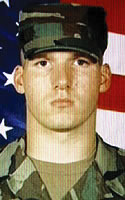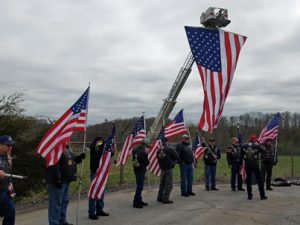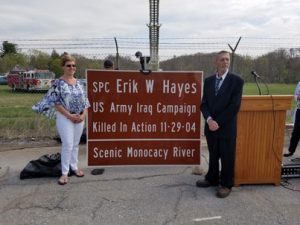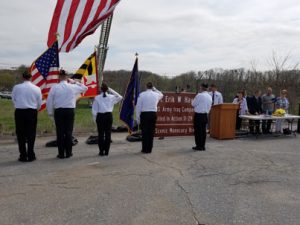James Rada, Jr.
 November 29, 2004, was Army Specialist Erik Hayes last day alive. He didn’t know it. The decorated soldier had just turned twenty-four a couple of weeks earlier, and was a young man with dreams. He wanted to attend college and become a veterinarian; but most of all, he wanted to return home to his family.
November 29, 2004, was Army Specialist Erik Hayes last day alive. He didn’t know it. The decorated soldier had just turned twenty-four a couple of weeks earlier, and was a young man with dreams. He wanted to attend college and become a veterinarian; but most of all, he wanted to return home to his family.
As he sat on the roof of an Iraqi police station with Sgt. Daniel Hopson, watching the streets, Hopson posed a question. If Erik could go anywhere for a vacation, and money was no object, where would he go?
Hayes turned to his friend and said, “All I want to do is go home and work three jobs and get my brother home healthcare and get him taken care of.”
Bradley Hayes had been injured in a car accident two years earlier when he was only eighteen, and was being cared for in a Hagerstown facility.
Hopson, who has six sisters, was moved by how much Hayes loved his brother. “I need a brother like you,” he told Hayes.
Hayes looked at him with a bit of surprise and confusion in his expression. “Hopson, we are brothers, brothers in arms.”
Later that night, Hopson was with Hayes on the mortar tank that hit an improvised explosive device. Hayes died far from his home and became the sixth Marylander to die in Operation Iraqi Freedom.
On Saturday, April 15, 2017, Hopson, Hayes’ family, friends, politicians, and Veterans gathered near the Monocacy River to celebrate Hayes’ life, remember his service, and honor his sacrifice.
 More than one hundred people were at the State Highway Administration building, where Maryland 140 crosses the Monocacy, to take part in the dedication of the bridge sign for the nearby bridge in honor of Hayes. The sign that would be installed at the beginning of the bridge was unveiled, and Hayes’ parents were given miniature versions that they could keep with them.
More than one hundred people were at the State Highway Administration building, where Maryland 140 crosses the Monocacy, to take part in the dedication of the bridge sign for the nearby bridge in honor of Hayes. The sign that would be installed at the beginning of the bridge was unveiled, and Hayes’ parents were given miniature versions that they could keep with them.
Maryland State Delegate William Folden, who is also a Veteran, said getting the bill passed that allowed the bridge to be named in Hayes’ honor was the first bill he had ever introduced in the legislature. More than a “feel good” bill, he expressed that acts such as this mean something to servicemen and their families. He said the idea for the bill had been inspired by a trip that he and his son had taken to West Virginia, where many bridges and other structures have been named in honor of fallen West Virginians. His son had asked about the people named, which had led to him looking up information about the serviceman.
“I hope that every time someone crosses that bridge, they will keep in mind the sacrifice he [Hayes] made, and other young men and women are making for the freedom we have,” said Frederick County Commission President Bud Otis.
To date, 145 Marylanders have been killed in Operation Iraqi Freedom.
Frederick County Councilman Kirby Delauter was the emcee at the event. Also in attendance were Frederick County Executive Jan Gardner; Carroll County Commissioners Stephen Wantz, Richard Weaver, and Dennis Frazier; Taneytown Mayor James McCarron; and members of the local VFWs and American Legions. Patriot Guard Riders and Desert Knights also escorted a procession of cars to the ceremony.
Hayes was born in Gettysburg, Pennsylvania, but he grew up in Thurmont and Harney. He graduated in 1998 from the Living Word Academy in Blue Ridge Summit, Pennsylvania. Before he had joined the military, he had worked at a dairy farm and trained to be an electrician.
He had enlisted in the army in 2001 to be able to use the GI Bill to get a college education when his duty was complete. He had trained at Fort Benning in Georgia, and served in Germany, Bosnia, and Kosovo before being trained in Iraq.
Hayes’ father, Daniel, said of his son, “He was a good boy. He loved people. He loved animals.”
Hayes was also an artist, drawing whenever inspiration hit him. His father remembers a drawing on the cover of one his son’s army notebooks that showed a camel smoking a cigarette out in the dessert.
His fellow soldiers also remember him with love and respect.
SSgt. Erik Pisauro of Charlotte, North Carolina, first met Hayes when he was eighteen and said that Hayes watched out for him and kept him from getting in too much trouble. “He was a big brother to a lot of us younger guys,” Pisauro said.
Sgt. Tim Grossman of Lexington, Kentucky, said, “Even though I outranked him, I learned to listen to what he said. He had a lot of wisdom for someone his age. When he spoke, you had to respect his answers; he wasn’t rash in his thinking.”
Grossman and others also noted that Hayes was generous to a fault. “He would give you the last five dollars he had until the next pay,” Grossman said.
SSgt. Andre Topaum of Raleigh, North Carolina, first met Hayes when he was eighteen. One memory that continued to shape his career in the military was something that Hayes said to him early on. “Dang it, Topaum, pay attention and take notes.” Topaum said it is something that he still continues to try and do.
Hopson, who is from Oklahoma, arrived in Iraq as a sergeant and didn’t have experience on mortar tanks where he was assigned. One of the first things Hayes said to him was, “I won’t ever let you get embarrassed, Sergeant; if you don’t know the answer to something, I’ll tell you.”
Hayes has touched the lives of these men so deeply that they were willing to travel hundreds of miles sixteen years after his death just to pay him one final honor.
“Just remember Erik’s name, and he will become a legend forever,” Hopson said.

(above) Army Spec. Erik Hayes’ parents, Debora Reckley and Douglas Hayes, stand next to the bridge sign for the MD 140 bridge over the Monocacy River that was named in honor of their son.
(below) The VFW Color Guard prepares to retire the colors during the April 15 ceremony that dedicated the MD 140 Monocacy River Bridge in honor of fallen Spec. Erik Hayes.


